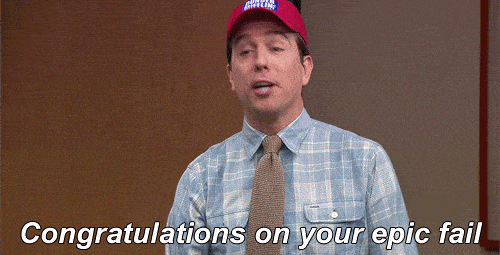Here’s a harsh truth I’m going to lay down for you: You’re going to fail.
If you want to be an entrepreneur, you’re going to have to wrap your head around the fact that the odds are stacked against you.
The general rule of thumb is that for every 10 startups out there, three or four of them will fail completely. Another three or four might survive long enough to see a return on their original investment, but only one or two will provide substantial returns. Furthermore, according to one Harvard report, it’s estimated that 95% of all startups will fail.
I know for those of you who have a fear of failure this isn’t exactly good news. But this is the reality that we all have to accept as we pursue our entrepreneurial goals.
But rather than run and hide, since it’s inevitable that we’ll fail at some point in our lives, let alone as entrepreneurs, it’s absolutely vital you learn how to overcome failure.
Failure can hurt. It can stop you dead in your tracks and make you question everything about yourself. But it doesn’t have to be the end of the world. It doesn’t have to be the end of your journey unless you allow it to be. In fact, it can even be turned into a secret weapon if you can learn how to spin your stumbles into strengths.
Here are some practical ways to overcome those unavoidable setbacks, mishaps, and downright bombs on your journey as an entrepreneur.
Accept That Failure Happens
As easy as it is to talk about why you shouldn’t fear failure the fact remains that failure hurts.
As kids, we begin to learn early on that there is nothing more shameful than making a mistake, and that we should avoid being wrong at all costs. As soon as we are able to start thinking for ourselves, it’s ingrained into us that failing is the worst thing that you can possibly do.
It’s no wonder that we’ve developed such an unhealthy obsession with failure and why some of us go to such great lengths to avoid it at all costs.
Step one in learning how to deal with failure is to unlearn that knee jerk terror associated with it, and embrace the fact that in some way shape or form, you will eventually fail. The sooner you’re able to accept this fact of life, the easier it will be for you to get over it.
Mistakes will happen, things will spiral out of your control, and deadlines will be missed. Yes, it will hurt, and yes, you’re allowed to be sad, but that doesn’t mean it’s the end of the world. With that understanding comes the important distinction that not all failures are the same.
For example, there is a world of difference between messing up a presentation and mismanaging your company’s finances. But we’re often so hard on ourselves that any instance in which we don’t shine can elicit the same psychological blow; we freak out over every error regardless of how minuscule it might be.

Then, whenever you find yourself panicking over something that didn’t go the way you wanted it to, take a moment to ask yourself if this situation is really the end of the world. Is it going to matter in a month or a year? Force yourself to think objectively, and try to look past all your roiling emotions to observe the situation for what it really is.
If it’s not going to bring the world crumbling down around you, if the sun is still going to rise tomorrow, if you can eventually get back up and brush yourself off, then it’s an “acceptable failure.”
Thankfully, the majority of our failures aren’t actually that severe, even though they may sometimes feel like it. Rarely will you make a mistake that destroys the livelihood of yourself and the people around you.
Even then, it’s been proven time and time again that the most devastating failures that seem like they would destroy us actually won’t. Very few success stories are lacking a chapter in which the subject’s cabinets are bare, options exhausted, and reputation in tatters.
Just take a look at prolific entrepreneurs like Arianna Huffington, who was rejected by more than 30 publishers before launching Huffington Post. Jeff Bezos had weathered steady allegations time and time again that he and Amazon were finished after multiple failed projects.
Steve Jobs was fired from his own company, and yet he still came back swinging and went on to become an icon and a hero for generations of businesspeople.
Failure is a natural part of the process, and without it, you cannot possibly succeed. No one has ever gotten things right on their first try, and no one expects you to do it either. So don’t put that kind of unnecessary pressure on yourself, there’s no need for it.
The champions among us have succeeded precisely because they have been willing to fail over and over again.
Take a Moment
Our natural reaction whenever we encounter failure is to shut down. It’s one of the reasons why we’re so afraid of it. All the emotions and feelings that come with failure can be so acute and so overwhelming that it can sap away our strength and make us want to curl up into a ball and retreat from the world.
“Failure can be emotionally taxing. As an entrepreneur you put a lot of time, effort and money into your business, so watching it crash is heartbreaking.” – Richard Branson.
As a result, a mistake many people make when dealing with failure is trying to take action as soon as possible. While commendable, this is the equivalent of running from your problems. Instead, take a moment to let yourself mourn over the loss you’ve been dealt. You need to be able to process your grief so you can be sure that you’re making the right decisions as you move forward.
It’s also common for people to chase after a loss, hoping to find a way to “correct” it somehow. Think of the gambler who lost a few bets and is now doubling down on everything, hoping to somehow earn back the money so they can “make everything right” again.
It’s tempting to try to ignore the pain and forget it by throwing yourself into the next project. The human brain does everything it can to avoid pain, after all, and the instinctive response is to run away from it as fast as possible.
While it may be uncomfortable to sit down and confront the source of your failure, at the very least, you have to make sure that you’re spending your time and energy wisely.
Brad Feld of Techstars has his own unique approach when it comes to dealing with failure. No matter how big or small, he lets himself dwell on it for a set time.
“I give myself 24 hours to mourn a failure. When something fails, I wallow in it for a day. And then I move on. I never let it stay with me for more than a day. But I give it its one day.” – Brad Feld, founder of Techstars.
Whether you need a day, or two days, or even a week, give yourself time to process what happened. While you can’t always control the situation around you, you can always control your reaction towards it.
A study that followed 59 executives and engineers who recently lost their jobs found that those who deliberately confronted their emotions were more likely to feel in control of their situations and had higher senses of self-esteem compared to those who didn’t.
Unsurprisingly, the ones who spent some time resolving their emotions over the loss were also far more likely to get back on their feet and find employment again.
It’s important to remember that in order to truly learn and overcome our failures, we need to take a moment to think about them. Otherwise you’re just rushing blindly forward and you’ll find yourself making the same mistakes over and over again.
You Don’t Fail; You Just Learn
In the startup world, we often talk about how important it is to “fail forward.” That is, to find the silver lining in even the cloudiest of situations.
For entrepreneurs, every failure, mishap, or mistake embodies a valuable opportunity for learning and self-reflection. Taking a step back to analyze every setback is a vital skill for every entrepreneur.
The trouble is, no matter how many times you hear the cliché “failure is the greatest teacher,” it can be very easy to get caught up playing the blame game, chasing losses with a sunk-cost mentality, and spiralling into a mire of self-pity anddepression.
In order to truly be able to overcome and learn from failure, you must first have the right mindset when it comes to analyzing your failures.
“I have not failed. I just found 10,000 ways that won’t work.” – Thomas Edison.
For starters, that means you stop looking for something or someone to blame. Some people will blame themselves, some will blame others, and some will just say they had no control over it. Instead, try to take a step back and look at the situation as objectively as possible.
Be brutally honest with yourself and the situation. Examine what factors were within your control, and what factors were outside of your control. You’re not playing the blame game here—you just need to know the sequence of events that led to this particular setback.
The important thing here is to get it out of your head and to write all of it down.
One simple way to analyze your failure is to evaluate it in stages. This way you can make sure you leave nothing out, and you can make the most out of your mistake.
One of the greatest things about failure is that it’ll be brutally honest with you.
First, take a good look at your planning. Ask yourself honestly whether or not you set your expectations too high, and whether or not you created a viable plan for you to achieve your goal. Ask your team members, colleagues and mentors for their advice, and see what they have to say about your original plan.
Next, you want to assess your preparation. Did you create an environment up front that maximizes success and reduces risk? Many people tend to skip over this part, but often you’ll find the reason behind your setback can be found here.
Did you give yourself enough time to do what was needed to be done? Did you rely too much on an uncontrollable factor? These are the types of questions to be asking yourself in this phase.
Thirdly, take a look at your execution. Assess if there was any point where things didn’t go according to plan and for what reason. Did you have a drop in motivation or energy? Was there an alternative option that you didn’t consider?
When all is said and done, remember that failure is just like any other experience that teaches us something. It adds to our repertoire of knowledge, and for that you should be grateful for it.
Overcome Failure by Taking Action
“Fall down seven times, stand up eight.” – Japanese proverb.
This might sound like it’s contradicting the advice to take a moment, but one you’ve performed your post-mortem, there’s often another common phenomenon that pops up. Even after recovering from and analyzing a failure, it can be easy to find yourself stalling. You can get stuck in a weird period where all you’re doing is just constantly rehashing what went wrong, or even worse, find yourself in a depressive spiral.
It might be difficult to jump back on the horse again, but at some point, once you’ve processed, you need to start taking action. Even if it feels a little uncomfortable. After all, the only way you can ever really fail is to give up entirely.
A key part in learning how to overcome failure is learning how to develop the determination and resilience to keep on going.
Legendary filmmaker Hayao Miyazaki recommends always having another project ready, regardless of whether or not you succeed or fail.
Not only does it help drive growth and constantly pushes you to move forward. But if you do happen to stumble, then you’ll already have the next project ready to keep you pushing forward.
A very easy way to get back into the flow of things is to simply start creating a plan. You don’t need to go public with it, or shout it from the rooftops. But the simple act of putting together a plan of action can be all you need to get yourself excited about trying again.
But this time, now armed with the benefit of hindsight, start planning for failure.
Before you start a new project, hold a worst-case scenario meeting, in which every member of your team, or leadership at least, gets together and brainstorms every potential snag that could come your way.
Not will this better prepare you to handle any crises that arise, but you’ll also be able to troubleshoot potential flaws in your plan before you even begin. Research has even shown that by visualizing the process of failure, you’re much better mentally equipped to handle any stress or anxiety that comes your way.
By planning for failure, you actually drastically increase your changes of succeeding. Because this way you have contingency plans in place in case anything happens. You know exactly when to quit, and you can define for yourself what failure is before you ever need to reach that point.
For the non-planning types, another way to start taking action again is to simply surround yourself with the right people. Forget the naysayers who are undoubtedly out in full force and are more than happy to tell you, “I told you so.”
Instead of listening to them, start hanging out with other entrepreneurs, and even your mentors. It doesn’t matter if it’s in person or online, but start spending time around people who understand what you’re going through and are willing to support you.
Taking action doesn’t mean having to dive straight into the deep end. Often all it takes is realizing that failure hasn’t crippled you, it hasn’t stopped you entirely.
Knowing that you can still move and keep pushing forward can be all you need to overcome failure.
Conclusion
Failure is always going to sting, and that part is never going to change. But it doesn’t mean you have to be afraid of it for the rest of your life. Like most things, failure is a lot less scary when you know how to deal with it.
Every successful entrepreneur in the world has failed at least once, the best of them have all failed multiple times. When you spend your entire life avoiding failure, all you’re doing is letting failure take the driver’s seat of your life. Regardless of whether or not you’re an entrepreneur, don’t let the fear of failure keep you down.
You will fail. It will hurt. And you will get back up.
What lessons has failure taught you? When have you stumbled and how did you bounce back? Let us know in the comments below!



























